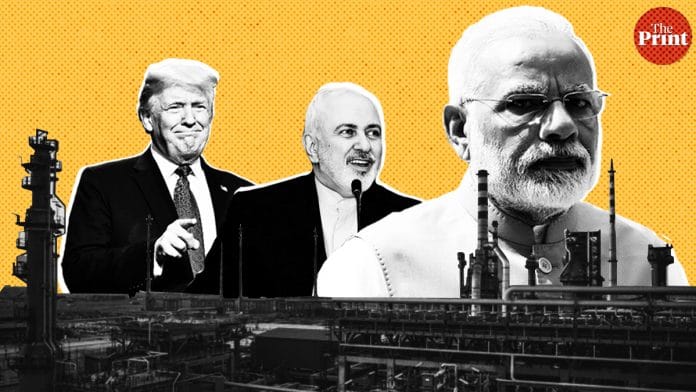Iran foreign minister Mohammad Javad Zarif arrived in New Delhi Tuesday, less than two weeks after the US ended the exemptions from sanctions granted to India to import oil from Iran. Zarif will meet external affairs minister Sushma Swaraj to deliberate on the impact of the US withdrawing the waivers.
ThePrint asks: With US lifting waiver on oil import, how will India salvage ties with Iran?
Foreign minister’s visit shows the importance Iran attaches to its energy and political ties with India
 Talmiz Ahmad
Talmiz Ahmad
Former Indian ambassador to Saudi Arabia
The visit of Iran foreign minister Mohammad Javad Zarif in the context of the removal of waivers that India had enjoyed for the past six months is significant. The first item on Zarif’s agenda will of course be to discuss the modalities related to continued imports of Iranian oil — especially given that Iran stood third among India’s biggest oil suppliers.
Linked to this will also be discussions on India’s other interests in Iran, some of which pertain to the hydrocarbon sector (gas and other refinery projects). There could also be a discussion on how to take Chabahar forward. Remember, Chabahar is not covered in the US sanctions. Besides
There is a whole range of possibilities as far as India’s talks with Iran are concerned. This visit also has immense diplomatic value, in that it attests to the importance Iran attaches to its energy and political ties.
The United States has unilaterally imposed sanctions on Iran, and not only harmed Iran but also harmed the political interests of many other countries that do not agree with its policies. The entire global energy order is being needlessly jeopardised due to the whimsical approach of one country.
India is a sovereign nation, and while there are many positions we agree on with the US, this isn’t one. I don’t understand how the question of the US or any country doing India any favour post-Pulwama arises. By accommodating India’s point of view and declaring Masood Azhar a global terrorist, they haven’t done India a favour. They are doing themselves a favour, because this is a global war on terror.
Also read: US needs India as an ally against China and can’t afford to bully it over Iran oil, trade
Iran minister’s sudden arrival in India shows Tehran wants to nip US pressure in the bud
 Mohammad Ahmad Kazmi
Mohammad Ahmad Kazmi
Freelance journalist, ex-IRNA and Iran Radio
This is the first time India is facing pressure from the US to stop importing oil from Iran, which has been supplying the black gold, approximately 13 per cent of our imports, at relatively lower cost and easier payment terms. The sudden arrival of Iranian foreign minister Javad Zarif, with the Lok Sabha elections still on, indicates the urgency in handling the pressure.
It seems Tehran has been giving utmost importance to continue exporting oil to India and other countries to successfully evade the US pressure. Iran’s expectation seems justified in the light of external affairs minister Sushma Swaraj’s recent assertion that India recognizes only United Nations’ sanctions and not “country specific” sanctions.
The reason extended by US officials desiring India’s cooperation in bringing Iranian oil export to zero, in lieu of reported US support after Pulwama terror attack, could exhaust India’s bureaucrats, in the absence of full-time political head because of the ongoing elections.
It seems that the US wants to gain India’s commitment, which could lead New Delhi away from Tehran, during virtually indecisive election period. However, India’s ambassador to the US, Harsh Vardhan Shringla, has recently indicated that India has been trying to convince the US to extend the waivers for some more time.
If India stops buying Iranian oil, it will drastically influence petrol and diesel prices in the country. Indian oil companies have been maintaining, on the advice of the BJP-led government, pre-poll prices, while crude oil has recently crossed $75 per barrel. Oil price rise immediately after 23 May is expected to be very high because it would not only compensate the non-rise during elections, but also match the international prices at the time.
Temporary waiver on US sanctions should be gained by the current bureaucrats to give enough space to the future government to take a serious call on the vexed question of importing oil from Iran.
India wants to tell Iran this is a temporary disruption and ties in other areas will continue
 Sujit Datta
Sujit Datta
Senior Fellow & Cluster Leader, VIF
The ending of the US waiver from sanctions on buying Iranian oil poses multiple challenges for India. Iran is India’s third largest supplier of oil, exporting some 3,00,000 barrels a day. The oil was suitable for Indian refineries and enabled New Delhi to balance its supplies from the Gulf. US sanctions on Iranian oil will hurt India — it will raise petrol and diesel prices and put severe pressure on the economy.
India must have indicated to Iran by now that its import of oil will significantly come down. But India is also expected to convey to Iran that this is a temporary disruption and other areas of relationship — work on Chabahar port, and on Afghanistan peace process (on which differences have emerged over the Taliban’s role) — will continue.
US president Donald Trump’s action will put pressure on the country’s ties with India, and raise questions on America as a dependent strategic partner. A similar dilemma exists in sustaining Indo-Russian defence ties in the face of US opposition.
Yet, India and the US share a widening sphere of common interest. The US is India’s largest trading partner, it is emerging as one of India’s most important defence suppliers and a source of oil. The ties with the US are also important for maintaining a favourable balance of power in Asia and the Indo-Pacific region. Both sides need to be sensitive to these interests.
In the meantime, India’s relationship with Iranian oil will suffer. We hope both countries are able to work their way through this difficult period. Iran foreign minister Mohammad Javad Zarif’s visit to Delhi is clearly important for sustaining this vital relationship.
India must recognise confrontation will pose security threat to its assets in Persian Gulf region
 Girijesh Pant
Girijesh Pant
Professor, International Studies and former director, Gulf Studies, JNU
The crisis in the Persian Gulf, as it is unfolding, is not confined to the security of oil supplies but concerns the region as well. India needs to recognise that the challenge is not limited to merely the oil coming from Iran. Alternative supply possibly could be organized, though at higher cost. Already India has been assured of it.
The real issue is that escalation of confrontation will pose serious security threat to Indian stakes and assets in the region. The benign space, created by the Iranian position for sixty days in starting enrichment of uranium and the American moderation to have talks with Iran, could possibly be used to deescalate the crisis.
India is not a major power to play a decisive role, and Iran understands the limitation but that does not provide reason to cave in. While the European Union is keeping the pressure, Asia also needs to show its resentment against the escalation of the crisis. It is essential for India to take initiative to project collective Asian voice if not for its success, at least to salvage the credibility.
Only the other day our foreign minister Sushma Swaraj has said loud and clear that India does not endorse unilateral sanctions. It is indeed an extraordinary situation. Indian diplomacy has to show its mettle.
Also read: The winner from Trump’s Iran sanctions? Saudi Arabia
Iran knows India can’t oppose US sanctions and hence wants to push various infrastructure projects
 Nayanima Basu
Nayanima Basu
Senior associate editor of foreign affairs, ThePrint
While India has stopped its oil purchases with Iran, Tehran continues to remain one of the key strategic partners for New Delhi in terms of connectivity to Central Asia, a fact that both India and Iran know too well. Iran is sensitive to the fact that the Modi government cannot oppose the stiff sanctions put in place by the Trump administration and hence their foreign minister Mohammad Javad Zarif is in New Delhi on a sudden visit to push for infrastructure projects such as the Chahbahar port, which is seen as India’s answer to Pakistan’s Gwadar port that has been built with the help of China.
However, this is for the first time that India has buckled under pressure from the US. Iran had been under sanctions previously as well but India had always found ways to buy oil from Iran through alternate mechanism of payment. Amid rising tensions between the US and Iran in the Persian Gulf with America deploying its warship there, the Indian government has also got worried as any eventuality of a war there may have a spill-over effect on South Asia.
During the visit of President Hassan Rouhani to India in February 2018, both sides had agreed to establish an international transport and transit corridor, along with Afghanistan. Prime Minister Narendra Modi and President Rouhani had also vowed to build a north-south transport corridor under the Chabahar framework.
By Fatima Khan, journalist at ThePrint.







There is a real risk of war. India’s foreign policy has been all over the place. The next government will almost have to start from scratch.